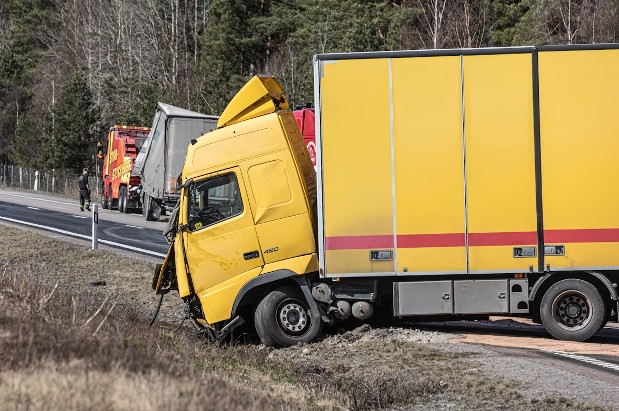Understanding Liability When Multiple Vehicles Are Involved in a Truck Accident
After a multi-vehicle truck accident, determining liability can become a complex legal issue. When more than one vehicle is involved, various factors come into play that impact how liability is established.
Complications in assessing fault increase significantly with multiple parties, making it crucial for victims to comprehend how these dynamics work. This understanding serves as a critical step toward navigating the aftermath of an accident and seeking just compensation for damages.

The Basics of Truck Accidents
Truck accidents involve various elements that differentiate them from standard vehicle collisions. Understanding these differences is important for grasping how liability is assessed in such incidents. Trucks are governed by a set of regulations due to their larger size and weight, which affects outcomes in accidents. Federal safety regulations mandate regular inspections, which truck drivers and companies must adhere to. Failure to comply can implicate the truck company and driver in an accident.
Compliance with such rules plays a significant role in liability, as negligent maintenance or operation may lead to crashes involving multiple vehicles. Involving various parties complicates who can be held responsible. Additional drivers, trucking companies, manufacturers, or even state maintenance crews may contribute to the accident. A thorough investigation will typically focus on the initial collision and on the interactions between different vehicles, which can implicate various defendants in lawsuits.
Determining Liability
Establishing fault in multi-vehicle truck accidents often involves scrutinizing several pieces of evidence. This evidence may include police reports, eyewitness accounts, and even traffic camera footage. Law enforcement typically plays a role in determining the cause, outlining which driver may have violated traffic laws and contributed to the crash. In many cases, experts are consulted to recreate the accident scene, analyzing factors such as vehicle speed and position at the moment of impact.
This information can help clarify misunderstandings surrounding the facts of the case and distinctly identify the responsible parties. For victims, understanding these details and how they’re affected by local laws serves to highlight their potential paths for pursuing claims. Victims looking into legal options for Laredo truck cases or Dallas cases should consult experienced legal counsel. Knowledgeable attorneys can guide them through the intricate web of liability and liability-sharing laws that apply in Texas, emphasizing the importance of collecting comprehensive evidence to support their claims.
Investigators often look into whether trucking companies adhered to safety regulations, including driver training and vehicle maintenance records. Logbooks, phone records, and black box data can offer additional insight into the actions leading up to the collision. Liability can be complex in these cases, potentially involving multiple parties such as drivers, employers, vehicle manufacturers, or cargo loaders.
The Role of Insurance Companies
Insurance companies play an important role in determining fault for truck accidents. Each driver or vehicle involved typically has their insurance policies, creating a mosaic of coverage that can complicate settlements. Depending on the circumstances, truck drivers may be covered by different policies, including personal auto insurance, a commercial truck policy, or even employer liability coverage. When multiple parties are involved, the negotiations between insurance companies can become contentious.
Each insurer may try to minimize its liability, leading to disputes over who bears the costs of an accident. This situation often leads to prolonged legal battles, making it critical for victims to have strategic representation. The impact of insurance negotiations extends beyond mere liability. It can determine how fairly compensation is offered. A multi-vehicle situation often means that compensation must address injuries, vehicle damage, lost wages, and other elements, increasing the stakes significantly.
Comparative Negligence in Texas
Texas follows the principle of comparative negligence, which influences how damages are awarded in multi-vehicle accidents. Under this system, victims can recover damages even if they share some degree of fault for the accident. The total damages awarded will be reduced by the percentage of fault attributed to the victim. This legal framework emphasizes the importance of thorough accident investigations. It may even encourage parties to collect more accurate evidence to support their claims.
If a truck driver is found to be 80% at fault while another driver holds 20% responsibility, the resulting compensatory payout will reflect those proportions. Engaging an experienced attorney is important in these cases, as they can effectively gather evidence to argue against any unfair attributions of liability. Demonstrating that the truck driver was primarily responsible can lead to significantly improved outcomes for the injured parties.

The Importance of Representation
After a multi-vehicle accident, retaining legal representation is important for navigating the complexities of the claims process. Attorneys specializing in truck accident cases possess the expertise necessary to advocate for clients’ rights. They can analyze intricate details surrounding the case and help victims seek the appropriate compensation. Victims often face mounting medical bills, lost income, and emotional trauma after an accident.
Having someone knowledgeable in the legal aspects can relieve undue stress by ensuring that all necessary paperwork is filed and deadlines are respected. Effective representation will ease negotiations with insurance companies, converting intricate legalities into more digestible parts for clients. Having legal representation helps investigate potential causes and rebut claims against victims effectively, leading to a more accurate determination of fault and ensuring victims do not settle for less than they deserve.
Understanding liability in multi-vehicle truck accidents involves evaluating the roles played by various factors and parties. From regulatory compliance to the intricacies of insurance negotiations, the path to determining fault can be challenging yet important for victims seeking justice and compensation. Navigating these complexities emphasizes the need for skilled legal representation, particularly in states like Texas, where comparative negligence laws may apply. Victims should secure qualified counsel to help them through the daunting process.


